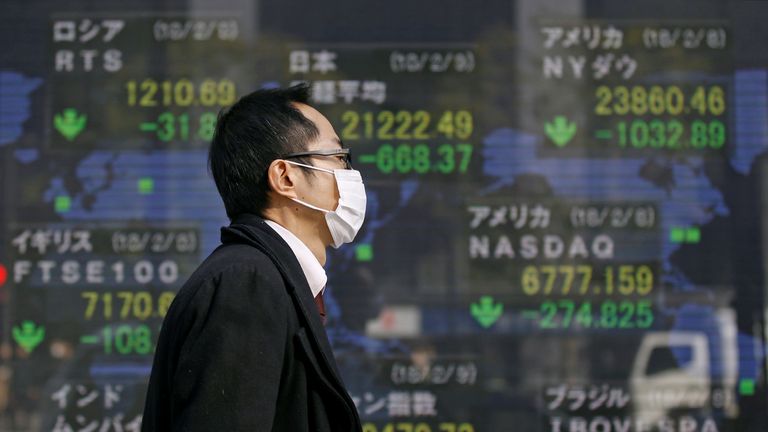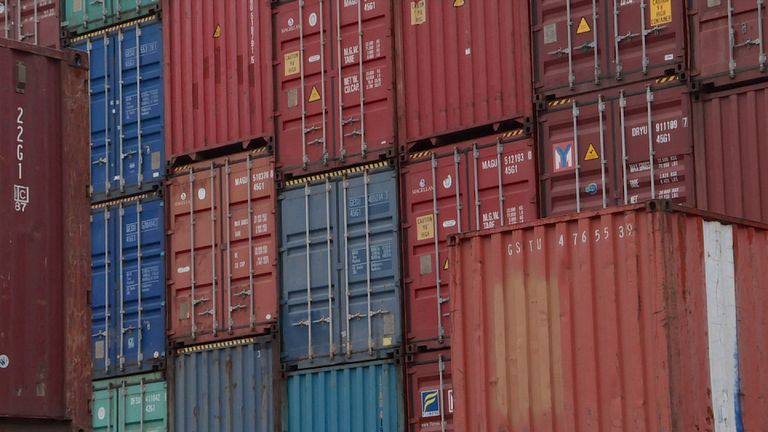Could the emerging markets summer slump go West?
Concern grows on whether the contagious sell-off of emerging market equities and currencies will spread to more developed markets.
Friday 7 September 2018 19:13, UK
It's been a rotten week for stock markets across the globe.
The FTSE-100 has slumped to its lowest level since the middle of April and is now down by nearly 5% since the beginning of 2018.
The Dax in Germany is trading at levels last seen at the beginning of April and is showing a modest loss for the year to date.
The CAC 40 in France is back to levels last seen at the beginning of July and is at break-even for the year to date.
The MIB in Italy is down 6% since the beginning of the year.
And the IBEX in Spain is languishing at levels last seen in December 2016.
Further afield, the picture is little better, with the Nikkei in Japan and the Hang Seng in Hong Kong down since the start of the year.
Only the US markets, given rocket fuel by Donald Trump's tax cuts, have been immune.
So what's going on?
Well, all of this started in emerging markets, which have seen a pretty indiscriminate sell-off during the summer.
There are plenty of emerging market economies with specific problems, including Turkey, Argentina and South Africa, which this week was confirmed to have fallen into recession for the first time in nine years.
But their woes have led to a general contagion among emerging markets as investors have looked for other countries which, like these three, have large amounts of debt - either government or corporate debt - that is denominated in US dollars.
In response to the strength of the US economy, the US Federal Reserve is raising interest rates more rapidly than the markets had anticipated, causing the US dollar to be one of the strongest-performing major currencies during 2018.
During the first half of the year, the greenback rose against all of the "G10" group of the world's most-traded currencies, other than the Japanese yen and the Norwegian krone.
When a large part of your debts are denominated in the US dollar, and your own currency falls against the dollar, you have a problem.
That is why so many emerging market currencies have been under fire - and that weakness has percolated through to equity markets in those countries.
Turkey's main stock index, for example, is down by a fifth so far this year, while Argentina's is down by 15% since the beginning of February - although it has rallied sharply this month, amid signs its government is set to win support from the International Monetary Fund.
There are other specific factors at play.
Many emerging economies are heavily exposed to commodities, many of which have suffered price falls amid concerns that a trade war with the US will hit demand from China, the world's biggest buyer of metals and some "soft" commodities.
The main stock index in Russia, amid concerns over the impact international sanctions will have on its economy, is down by nearly 10% since the beginning of July.
Yet the selling has been pretty indiscriminate.
Indonesia's economy is currently growing at more than 5%, its best performance for five years, yet its main stock index is down by 15% since the beginning of the year.
Overall, it means that emerging markets - as measured by the MSCI Emerging Markets Index - officially entered bear market territory on Thursday, having fallen by 20% since its peak in January.
The index is dominated by stocks in Asia where, above all else, concerns over Chinese indebtedness hang over markets.
The big question is whether contagion from this sell-off of emerging market equities and currencies spreads to developed markets.
There are plenty of reasons to be concerned. We are now into the 10th year of the bull run in equities and investors are mindful that, at some point, there will have to be a correction.
Any excuse to sell will be seized upon.
Donald Trump's protectionism concerns many: if the president raises tariffs against a further $200bn worth of Chinese goods - which would inevitably be reciprocated - that could see even the US stock indices crack.
In Europe, a mishandling of Brexit negotiations could cause disruption not only to the UK's economy but to many members of the EU, particularly key trading partners to the UK such as Ireland, Belgium and the Netherlands.
In the Eurozone itself, meanwhile, there have been rumbles of thunder as Italy's populist new coalition government threatens a stand-off with the European Commission over its budget deficit. Italy, unlike Greece, would be too big to save if international markets lost confidence in its ability to service its debts.
Overlaying all of this is the knowledge that, for many stock markets, September is the worst month of the year.
It has statistically been the worst month for the main US stock indices while the FTSE-100, since it was launched in 1984, has historically fallen on average in September by just under 1%.
That ought not to have too much of a bearing on things - past performance, as the regulatory blurb puts it, is no guide to future performance - but a lot of market participants can be superstitious about these things.
If there is contagion from emerging markets, analysts at Bank of America Merrill Lynch suspect it is likely to hit European assets next, noting that European banking shares have been drifting lower for most of the year, while Germany, the continent's most important economy, shows signs of coming off the boil.
German factory orders unexpectedly fell sharply in June and July, raising concerns that the country will be one of the main victims of Mr Trump's tit-for-tat trade disputes, with the rise in the euro against many currencies, including the pound, making German exports more expensive.
That said, a few months ago, investors looking for a trigger for a global sell-off would have probably alighted first on the US tech sector due to the stratospheric valuations being hit by some of its leading stocks.
Since then, shares of Facebook have officially entered bear market territory, while both Apple and Amazon have seen their stock market valuations blast above $1tn.
And, overall, other concerns have also failed to come to pass.
The great bull run in bonds shows no sign of stalling, despite the Fed's rate rises, while global GDP growth continues to be steady - albeit not as strong as in 2017 - despite trade war fears.
So, while not yet panicking, stock market investors continue to keep a wary eye on the exit.









